SEO
I Subscribed to 71 SEO Newsletters. Here Are My 10 Favorites
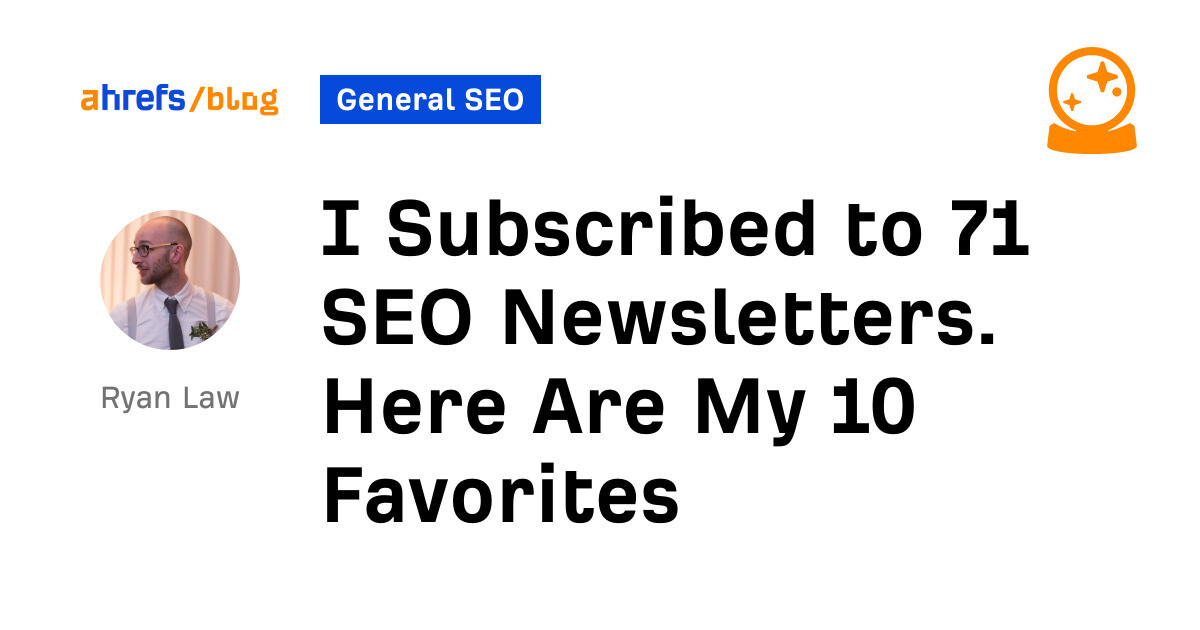
There are lots of SEO newsletters. Maybe too many.
I sacrificed my email inbox to bring you a carefully chosen selection of favorites. Every newsletter included here does four things:
- Focuses specifically on SEO (and not just marketing)
- Offers valuable free content (and isn’t locked behind a Substack paywall)
- Sends regular emails (and hasn’t stopped publishing)
- Offers something unique (and does it better than any other newsletter)
The 10 newsletters featured here cover every corner of the search world, including Google algorithm updates, local SEO tips, detailed tutorials, and new job opportunities.
(And if you’d like to choose your own favorites, here’s my spreadsheet of all 71 newsletters.)
Best for: Getting a little taste of all things SEO
Author: Aleyda Solis
Number of subscribers: 28,000
Email frequency: Weekly on Sunday
Can you sponsor this newsletter? Yes—email Aleyda here
Subscribe link: https://seofomo.co/
#SEOFOMO is the Swiss Army Knife of newsletters. Once weekly, Aleyda Solis shares her selection of search news, interesting links, open jobs, upcoming events, and people to follow.
If your fear of missing out extends beyond search into marketing generally, Aleyda also curates the MarketingFOMO newsletter.
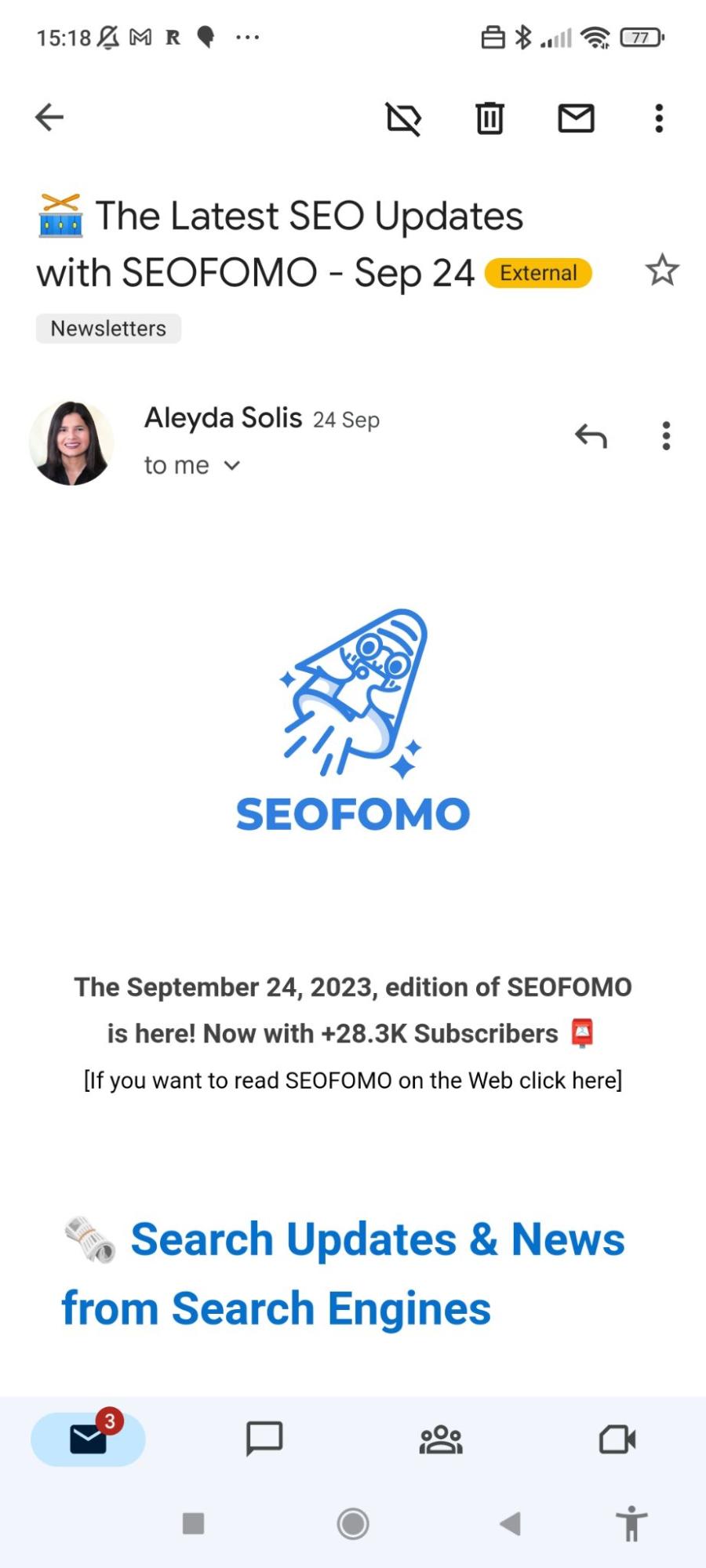
Best for: Learning SEO’s soft skills
Author: Tom Critchlow
Number of subscribers: 10,000
Email frequency: Every few months
Can you sponsor this newsletter? Not currently
Subscribe link: https://newsletter.seomba.com/about
The SEO MBA focuses on the “soft skills” of SEO like communication, problem-solving, and leadership.
You’re probably pretty great at keyword research and link building. The SEO MBA will help you level up in other areas: reporting wins to your boss, pitching new projects, and even interviewing for new jobs.
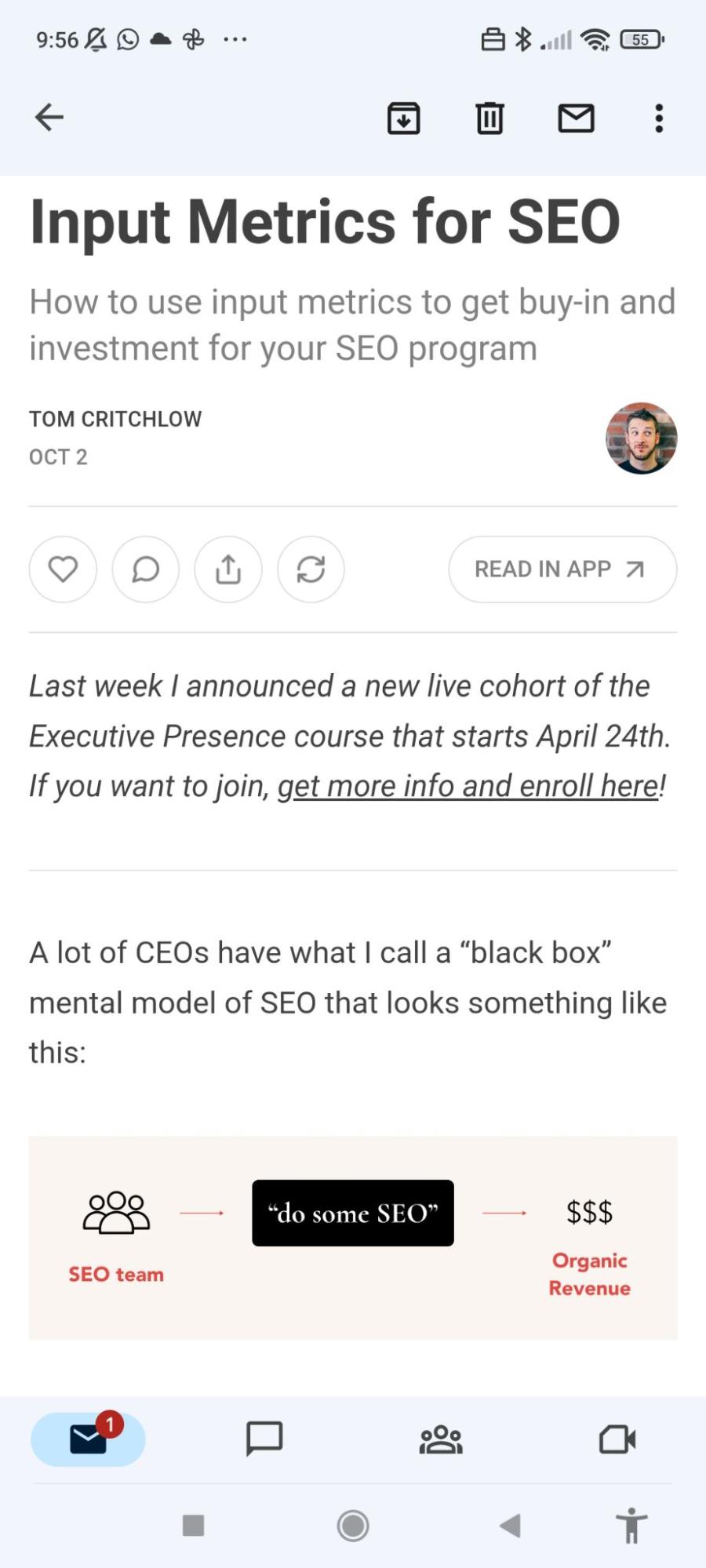
Best for: Understanding SEO for publishers and news outlets
Authors: Jessie Willms, Shelby Blackley
Number of subscribers: 7,750
Email frequency: Weekly on Monday
Can you sponsor this newsletter? Yes
Subscribe link: https://www.seoforjournalism.com/
WTF is SEO? covers core SEO concepts from the perspective of journalists and media companies.
Authors Jessie Willms and Shelby Blackley are both in-house SEOs at big news publishers. They write from personal experience on topics like using keyword research for news items, auditing complicated tag pages, and working within the constraints of paywalled content.
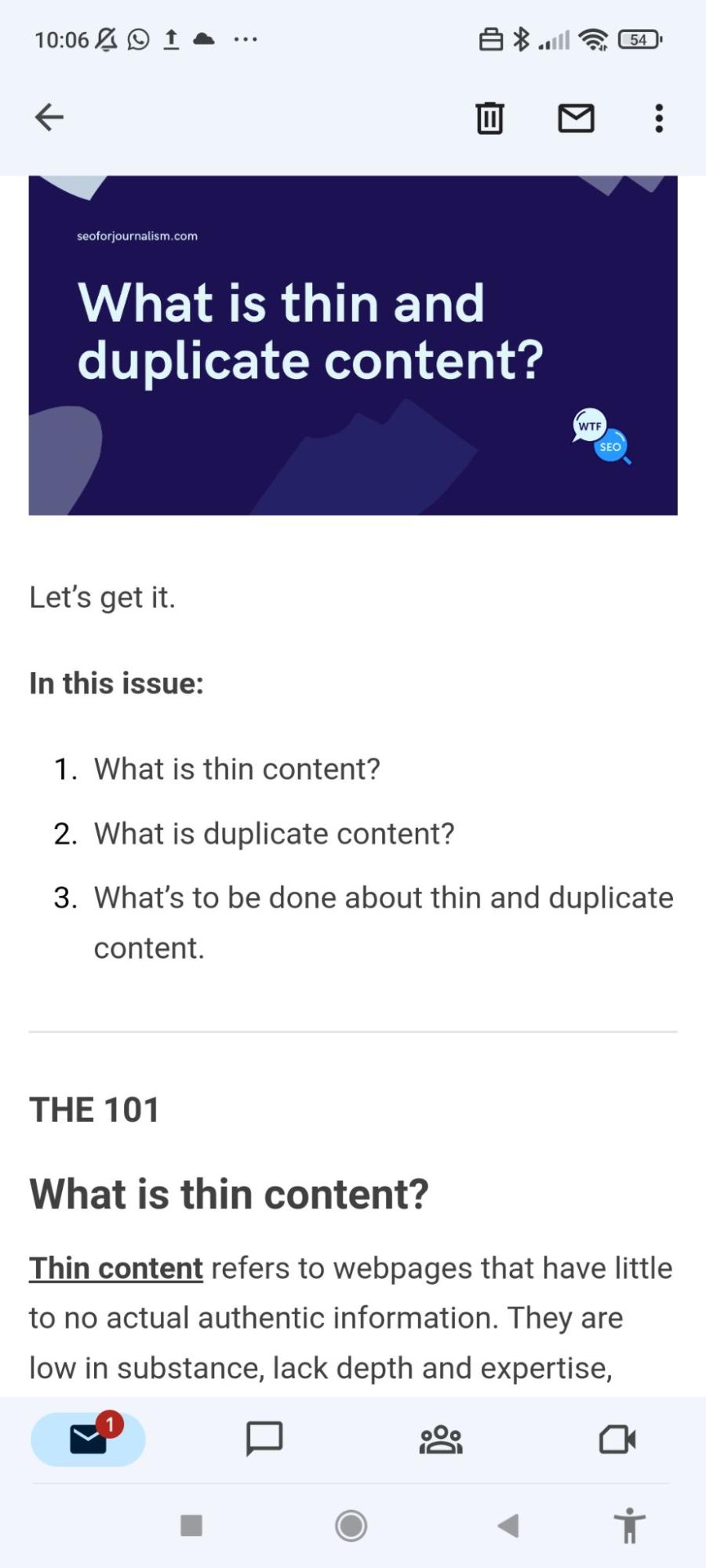
Best for: Original research into the biggest players in SEO
Author: Glen Allsopp
Number of subscribers: 30,000–40,000
Email frequency: Three to five emails per year
Can you sponsor this newsletter? No
Subscribe link: https://detailed.com/#newsletter
Detailed’s Glen Allsopp tracks the search performance of 2,917 companies (not a typo) and shares his findings every few months.
I’ve learned a lot from Detailed. For example: 562 of the biggest media brands are owned by just 16 companies. Together, they generate almost 4 billion clicks per month. And the biggest brand of the bunch? Pop-culture wiki site Fandom.
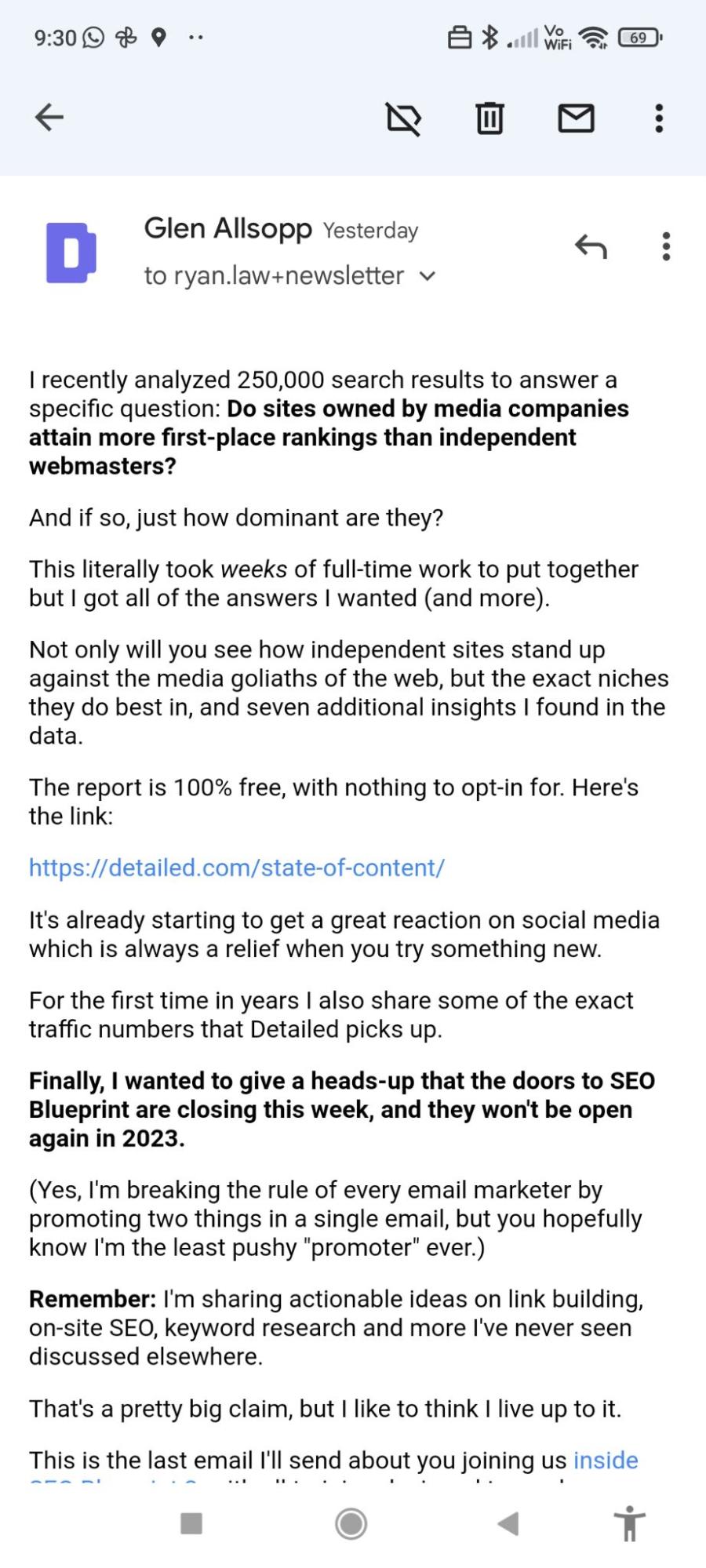
Best for: Quick, super actionable SEO tactics
Author: Steve Toth
Number of subscribers: 16,000
Email frequency: Weekly
Can you sponsor this newsletter? Yes—email [email protected]
Subscribe link: https://seonotebook.com/
SEO Notebook shares tactics plucked directly from author Steve Toth’s notebook. No long essays, no polarizing opinion pieces—just quick recommendations for better rankings.
Recent tips include finding zero-volume keywords that actually generate traffic, using regex in Google Search Console, and building links using the power of jealousy.
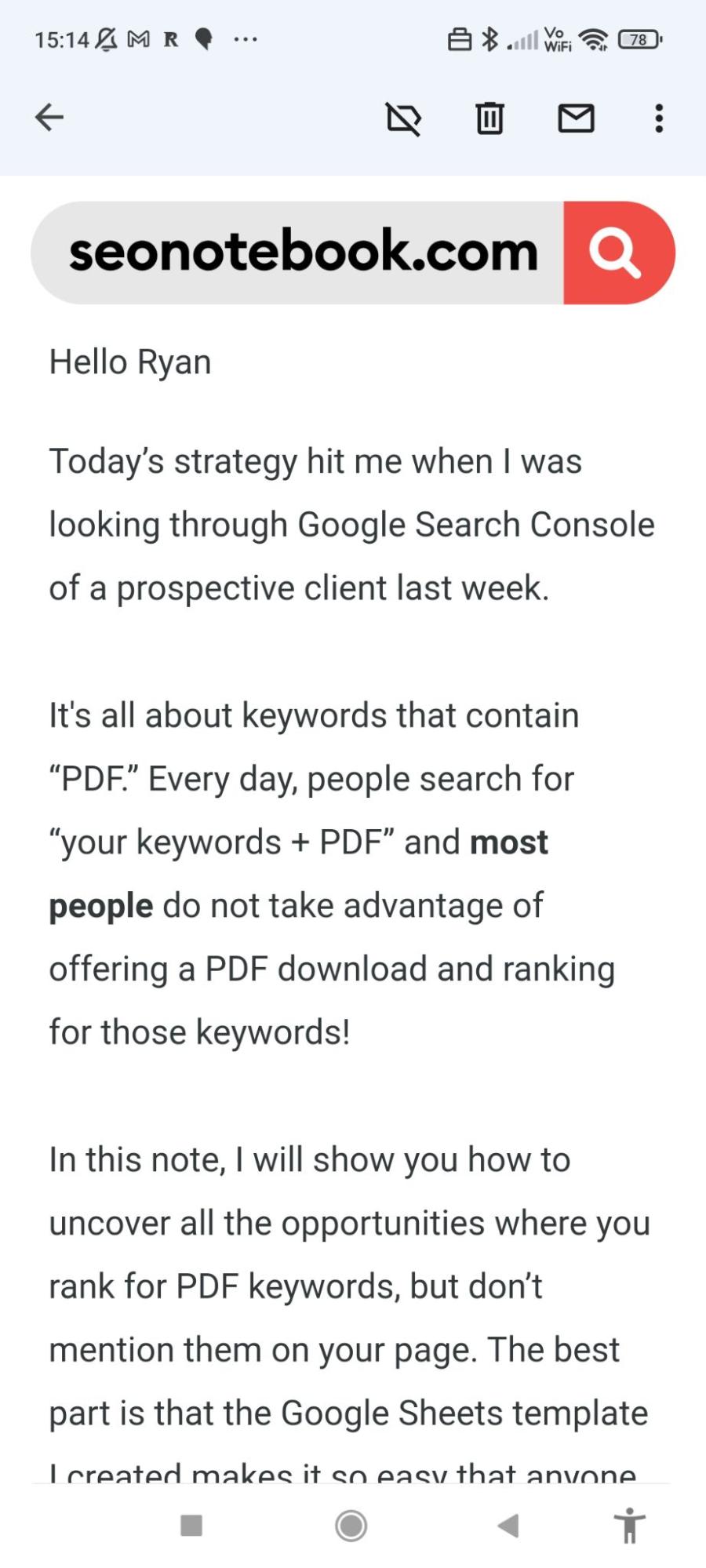
Best for: Following breaking news and emerging trends
Author: Many people
Number of subscribers: 200,000
Email frequency: Daily
Can you sponsor this newsletter? Yes
Subscribe link: https://www.searchenginejournal.com/newsletter-sign-up/
Search Engine Journal sends daily emails about the latest Google updates, industry news, and product launches. If you’ve ever seen “The Matrix,” reading Search Engine Journal is like being tapped into the SEO equivalent of the mainframe.
There are a lot of news roundups in SEO. Search Engine Land. Search Engine Roundtable. Search Engine Watch. Search Engine Obsessive. (OK, I made that one up.) I had trouble deciding between them, so I let X make the call.
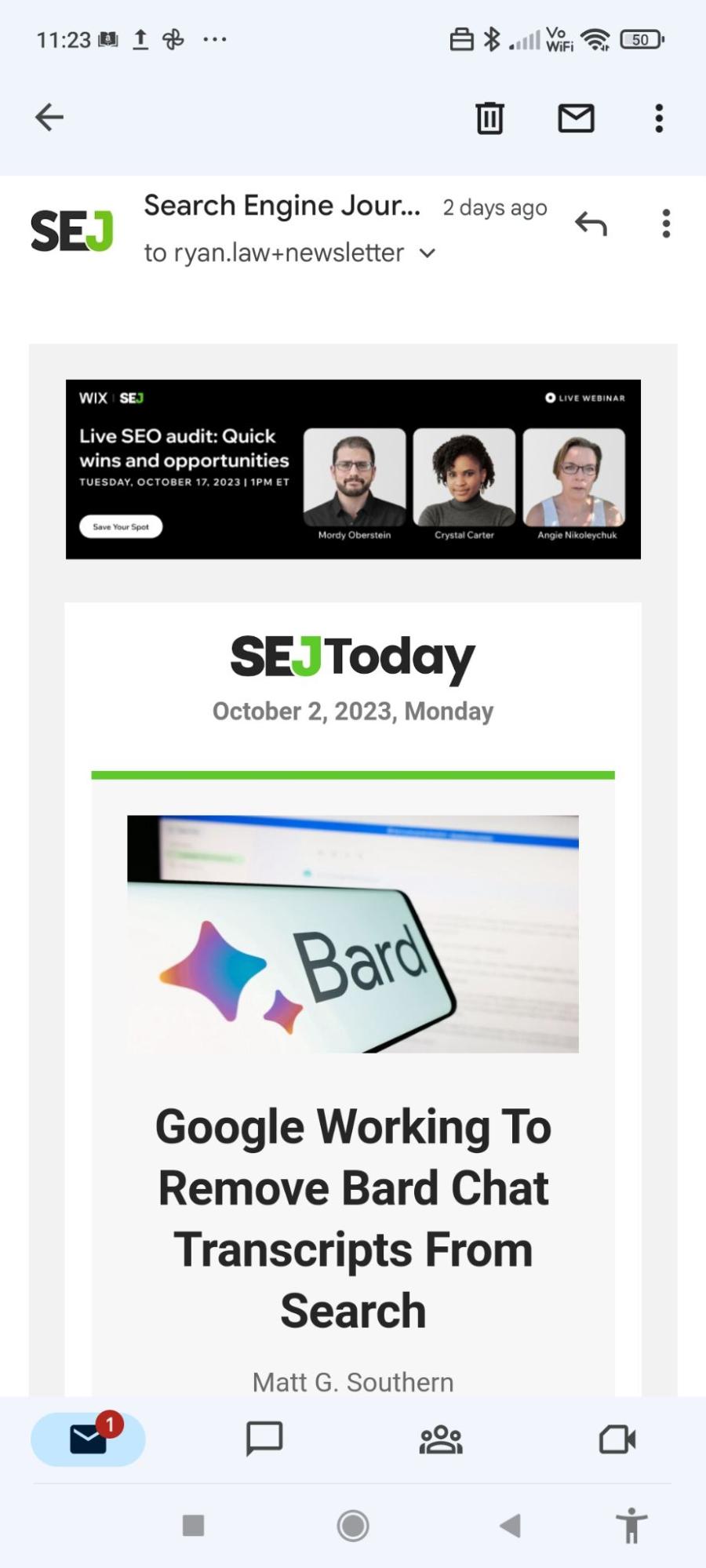
Best for: Making a male-dominated industry a little less male-dominated
Author: Areej Abuali
Number of subscribers: 4,000+
Email frequency: Monthly
Can you sponsor this newsletter? Yes
Subscribe link: https://www.womenintechseo.com/newsletter/
The Women in Tech SEO (#WTS) newsletter exists to highlight the incredible work of women in the search industry.
Every month, Areej Abuali shares a selection of projects, talks, and articles like Corina Burri’s ChatGPT use cases, Giulia Panozzo’s deep dive into causal impact analysis, and Esther Akinsola’s pivot from content marketing to SEO.
There’s more to #WTS than just the newsletter: There are community groups, conferences in three countries, and a podcast.
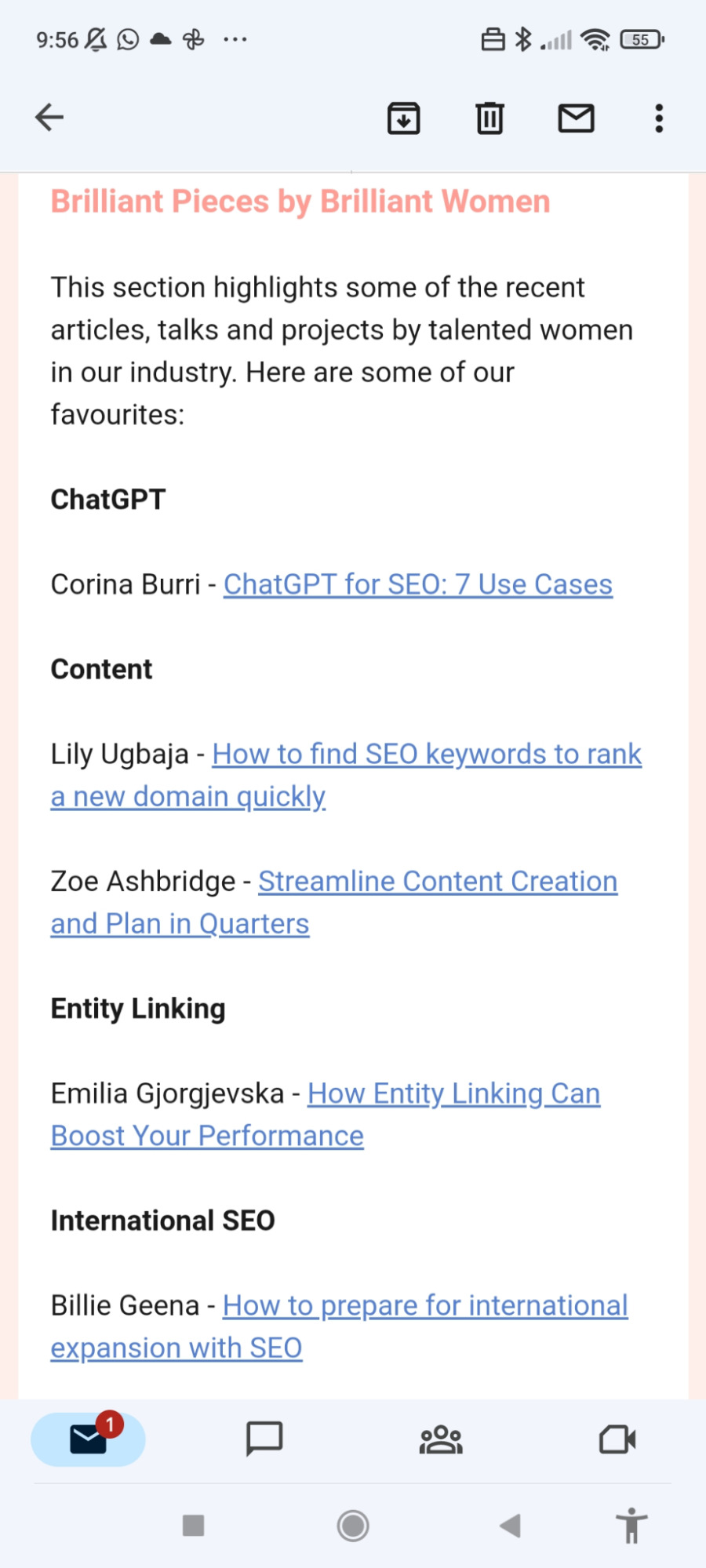
Best for: Exploring the niche and affiliate sides of SEO
Author: Spencer Haws
Number of subscribers: 67,000
Email frequency: Weekly
Can you sponsor this newsletter? No, just the podcast
Subscribe link: https://www.nichepursuits.com/join-newsletter/
Niche Pursuits explores how people use SEO to make their living online.
Spencer Haws and team share regular perspectives and case studies from the worlds of affiliate marketing, niche sites, and dropshipping. Recent success stories include a Japanese travel blog earning $5,000 per month and a D&D and miniatures site earning $8,000 per month.
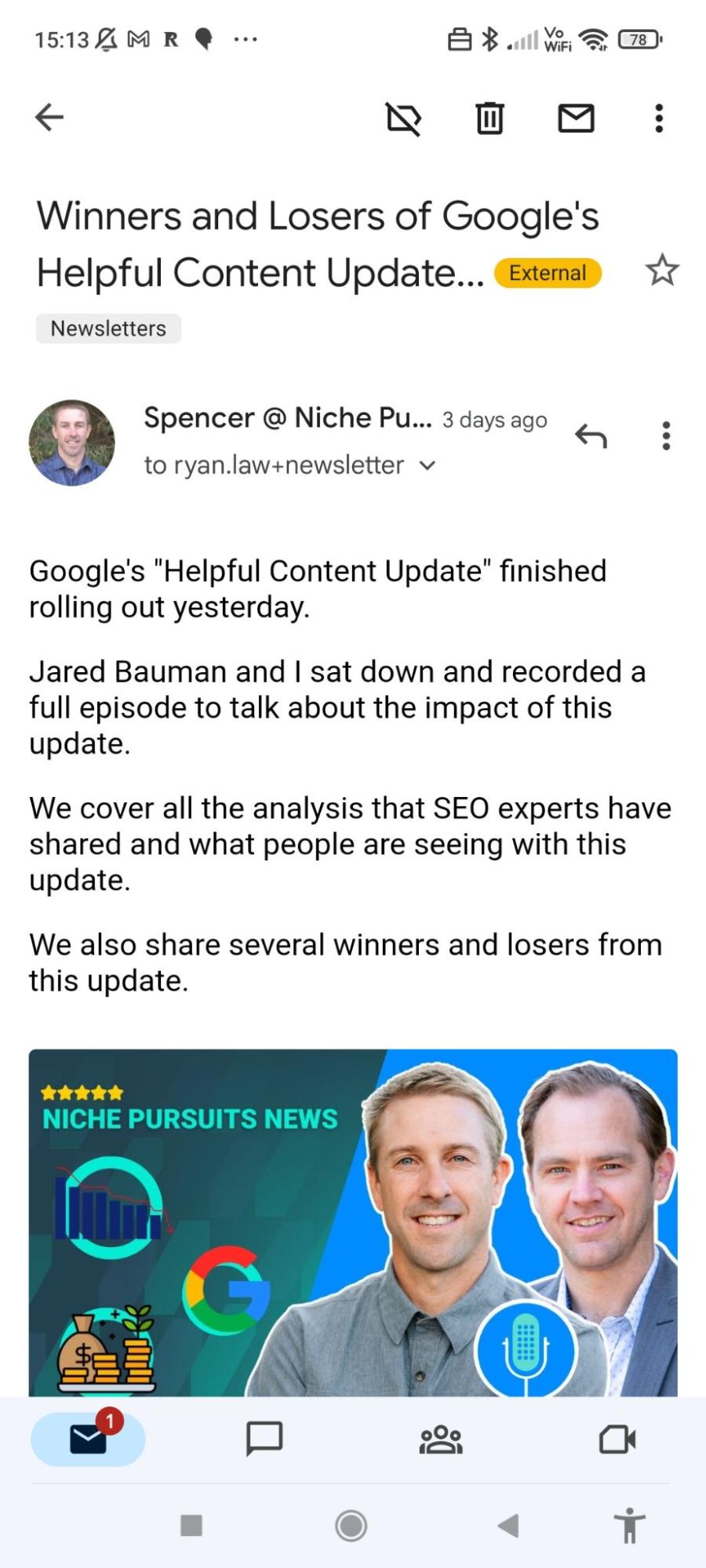
Best for: Improving your local SEO chops
Author: Phil Rozek
Number of subscribers: 10,200
Email frequency: Monthly
Can you sponsor this newsletter? Not currently
Subscribe link: https://www.localvisibilitysystem.com/
Phil Rozek writes an intensely detailed newsletter about the challenges and quirks of local SEO.
Phil proves that there’s more to local SEO than citations and location pages. My favorite recent example: why “search optimizing” your opening hours can boost your visibility in Google Maps and even help you rank for more keywords.
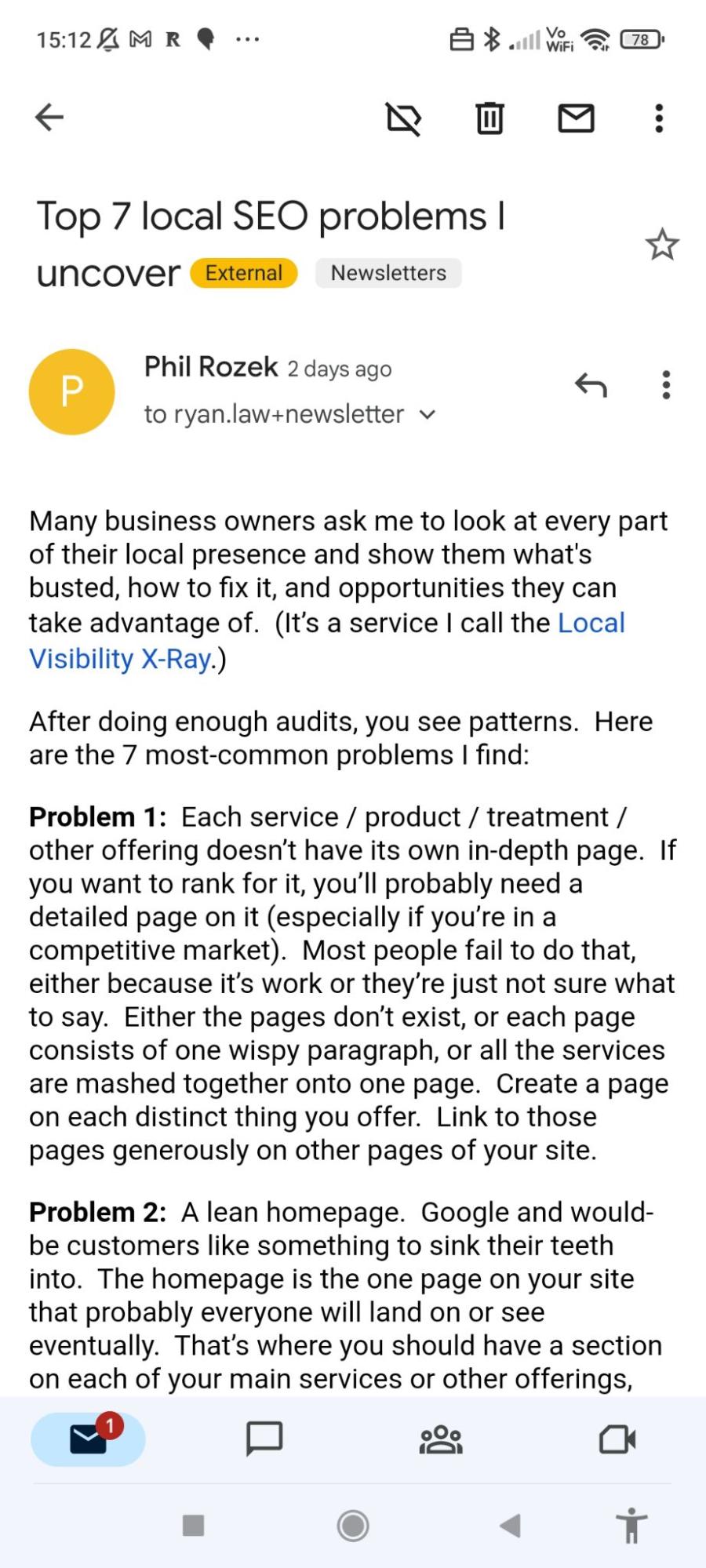
Best for: You guessed it: finding SEO jobs
Author: Nick LeRoy
Number of subscribers: 2,000
Email frequency: Weekly on Monday
Can you sponsor this newsletter? Yes—email [email protected]
Subscribe link: https://www.seojobs.com/
SEO Jobs sends a once-weekly collection of new SEO-specific job listings. You’ll find roles spanning in-house and agency, in-office and remote, from new starters up to leadership.
Nick LeRoy also writes the SEO For Lunch newsletter, the SEO Freelancer newsletter, and quite possibly several other newsletters in my spreadsheet.
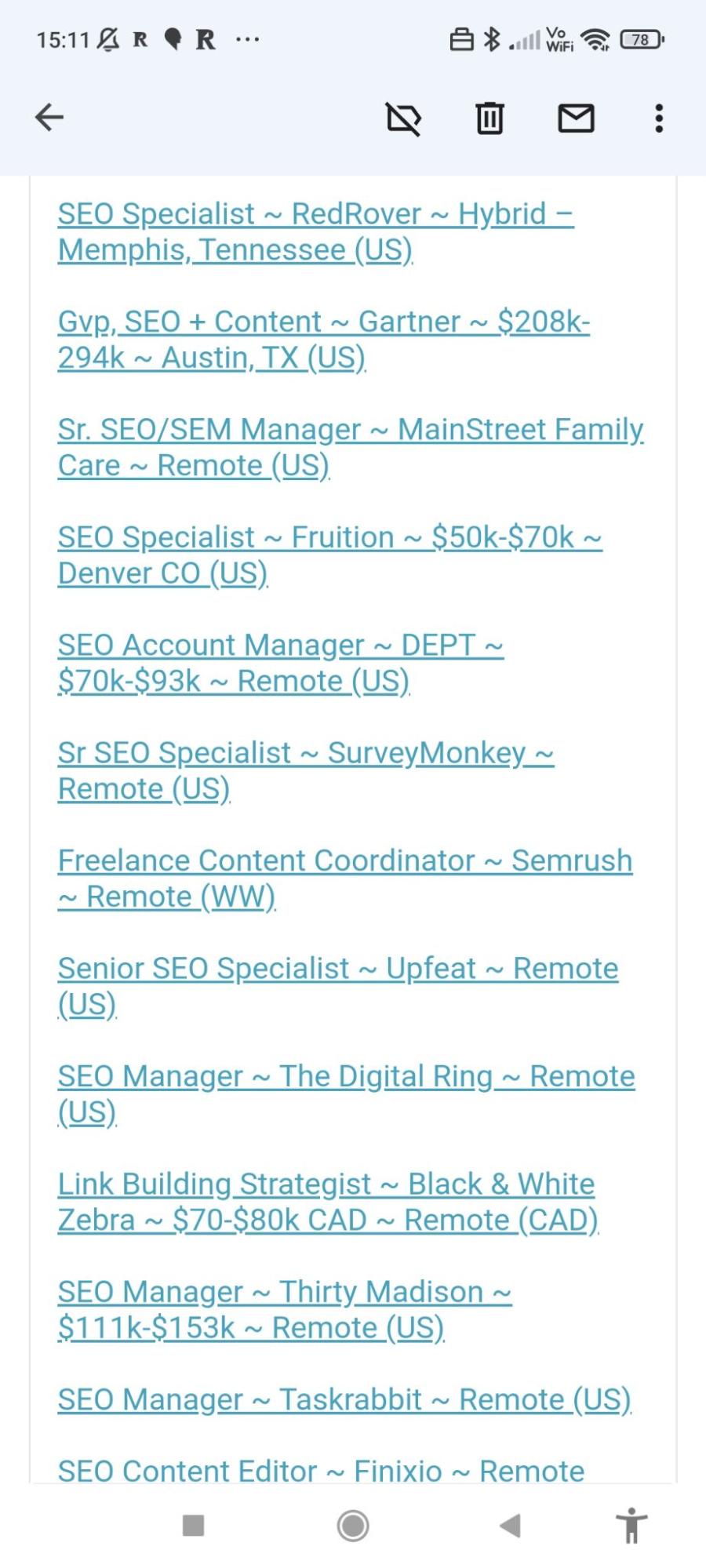
Final thoughts
I didn’t want to ruin my credibility by mentioning it sooner, but you should definitely subscribe to Ahrefs’ Digest. We’ll send you detailed SEO tutorials every week, alongside a collection of interesting reads from around the web. In all, 284,000 subscribers get the email every week.
Want to recommend another newsletter? Share it with me on X.
SEO
Big Update To Google’s Ranking Drop Documentation

Google updated their guidance with five changes on how to debug ranking drops. The new version contains over 400 more words that address small and large ranking drops. There’s room to quibble about some of the changes but overall the revised version is a step up from what it replaced.
Change# 1: Downplays Fixing Traffic Drops
The opening sentence was changed so that it offers less hope for bouncing back from an algorithmic traffic drop. Google also joined two sentences into one sentence in the revised version of the documentation.
The documentation previously said that most traffic drops can be reversed and that identifying the reasons for a drop aren’t straightforward. The part about most of them can be reversed was completely removed.
Here is the original two sentences:
“A drop in organic Search traffic can happen for several reasons, and most of them can be reversed. It may not be straightforward to understand what exactly happened to your site”
Now there’s no hope offered for “most of them can be reversed” and more emphasis on understanding what happened is not straightforward.
This is the new guidance
“A drop in organic Search traffic can happen for several reasons, and it may not be straightforward to understand what exactly happened to your site.”
Change #2 Security Or Spam Issues
Google updated the traffic graph illustrations so that they precisely align with the causes for each kind of traffic decline.
The previous version of the graph was labeled:
“Site-level technical issue (Manual Action, strong algorithmic changes)”
The problem with the previous label is that manual actions and strong algorithmic changes are not technical issues and the new version fixes that issue.
The updated version now reads:
“Large drop from an algorithmic update, site-wide security or spam issue”
Change #3 Technical Issues
There’s one more change to a graph label, also to make it more accurate.
This is how the previous graph was labeled:
“Page-level technical issue (algorithmic changes, market disruption)”
The updated graph is now labeled:
“Technical issue across your site, changing interests”
Now the graph and label are more specific as a sitewide change and “changing interests” is more general and covers a wider range of changes than market disruption. Changing interests includes market disruption (where a new product makes a previous one obsolete or less desirable) but it also includes products that go out of style or loses their trendiness.
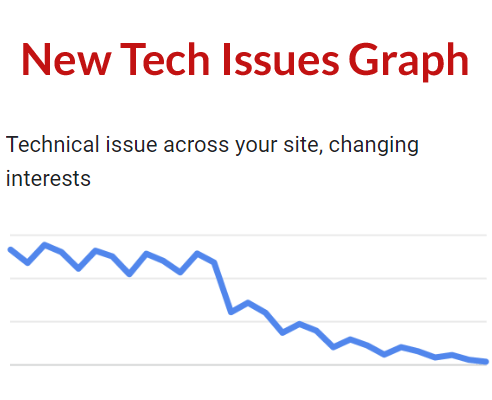
Change #4 Google Adds New Guidance For Algorithmic Changes
The biggest change by far is their brand new section for algorithmic changes which replaces two smaller sections, one about policy violations and manual actions and a second one about algorithm changes.
The old version of this one section had 108 words. The updated version contains 443 words.
A section that’s particularly helpful is where the guidance splits algorithmic update damage into two categories.
Two New Categories:
- Small drop in position? For example, dropping from position 2 to 4.
- Large drop in position? For example, dropping from position 4 to 29.
The two new categories are perfect and align with what I’ve seen in the search results for sites that have lost rankings. The reasons for dropping up and down within the top ten are different from the reasons why a site drops completely out of the top ten.
I don’t agree with the guidance for large drops. They recommend reviewing your site for large drops, which is good advice for some sites that have lost rankings. But in other cases there’s nothing wrong with the site and this is where less experienced SEOs tend to be unable to fix the problems because there’s nothing wrong with the site. Recommendations for improving EEAT, adding author bios or filing link disavows do not solve what’s going on because there’s nothing wrong with the site. The problem is something else in some of the cases.
Here is the new guidance for debugging search position drops:
“Algorithmic update
Google is always improving how it assesses content and updating its search ranking and serving algorithms accordingly; core updates and other smaller updates may change how some pages perform in Google Search results. We post about notable improvements to our systems on our list of ranking updates page; check it to see if there’s anything that’s applicable to your site.If you suspect a drop in traffic is due to an algorithmic update, it’s important to understand that there might not be anything fundamentally wrong with your content. To determine whether you need to make a change, review your top pages in Search Console and assess how they were ranking:
Small drop in position? For example, dropping from position 2 to 4.
Large drop in position? For example, dropping from position 4 to 29.Keep in mind that positions aren’t static or fixed in place. Google’s search results are dynamic in nature because the open web itself is constantly changing with new and updated content. This constant change can cause both gains and drops in organic Search traffic.
Small drop in position
A small drop in position is when there’s a small shift in position in the top results (for example, dropping from position 2 to 4 for a search query). In Search Console, you might see a noticeable drop in traffic without a big change in impressions.Small fluctuations in position can happen at any time (including moving back up in position, without you needing to do anything). In fact, we recommend avoiding making radical changes if your page is already performing well.
Large drop in position
A large drop in position is when you see a notable drop out of the top results for a wide range of terms (for example, dropping from the top 10 results to position 29).In cases like this, self-assess your whole website overall (not just individual pages) to make sure it’s helpful, reliable and people-first. If you’ve made changes to your site, it may take time to see an effect: some changes can take effect in a few days, while others could take several months. For example, it may take months before our systems determine that a site is now producing helpful content in the long term. In general, you’ll likely want to wait a few weeks to analyze your site in Search Console again to see if your efforts had a beneficial effect on ranking position.
Keep in mind that there’s no guarantee that changes you make to your website will result in noticeable impact in search results. If there’s more deserving content, it will continue to rank well with our systems.”
Change #5 Trivial Changes
The rest of the changes are relatively trivial but nonetheless makes the documentation more precise.
For example, one of the headings was changed from this:
You recently moved your site
To this new heading:
Site moves and migrations
Google’s Updated Ranking Drops Documentation
Google’s updated documentation is a well thought out but I think that the recommendations for large algorithmic drops are helpful for some cases and not helpful for other cases. I have 25 years of SEO experience and have experienced every single Google algorithm update. There are certain updates where the problem is not solved by trying to fix things and Google’s guidance used to be that sometimes there’s nothing to fix. The documentation is better but in my opinion it can be improved even further.
Read the new documentation here:
Debugging drops in Google Search traffic
Review the previous documentation:
Internet Archive Wayback Machine: Debugging drops in Google Search traffic
Featured Image by Shutterstock/Tomacco
SEO
Google March 2024 Core Update Officially Completed A Week Ago
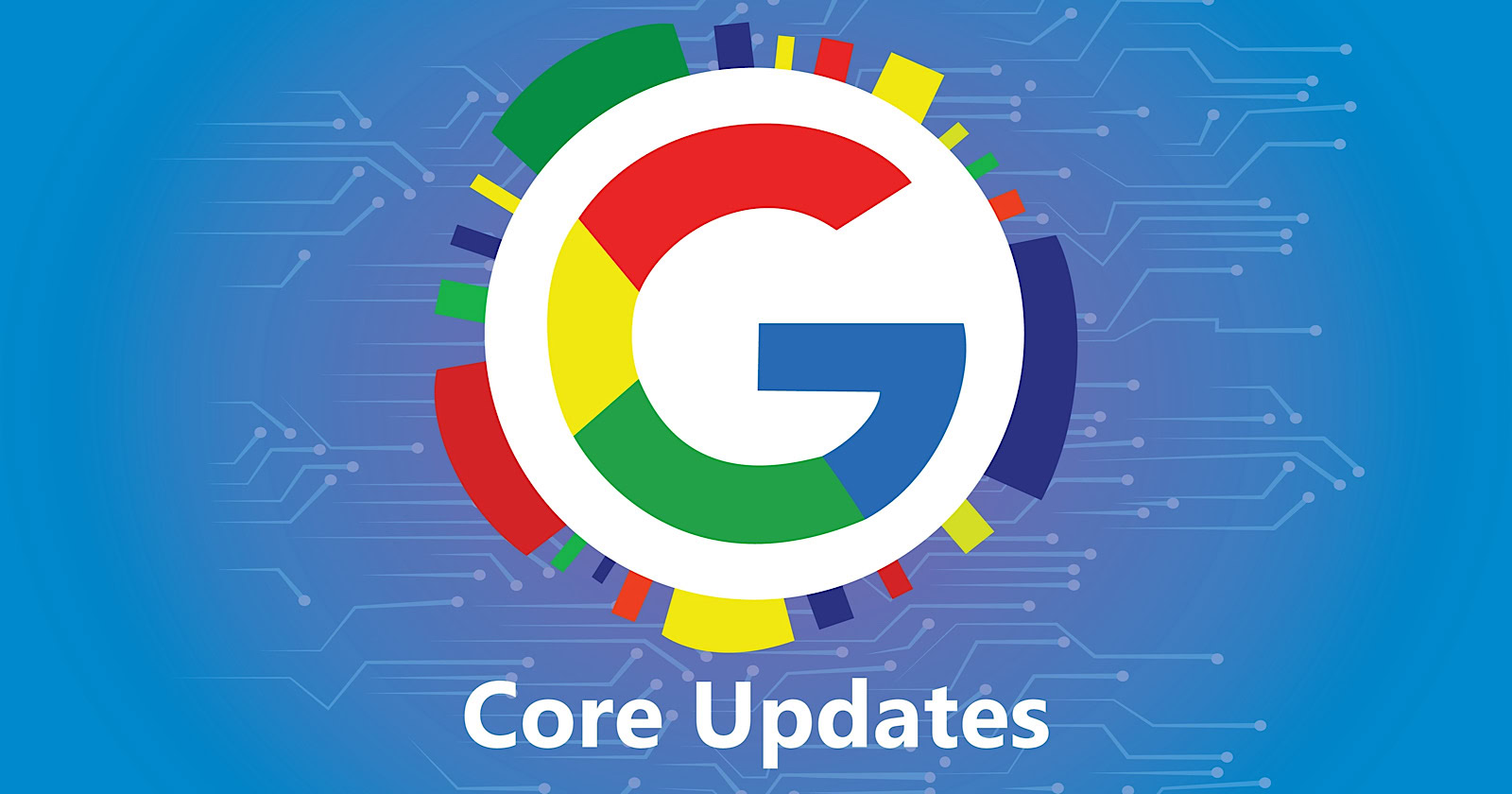
Google has officially completed its March 2024 Core Update, ending over a month of ranking volatility across the web.
However, Google didn’t confirm the rollout’s conclusion on its data anomaly page until April 26—a whole week after the update was completed on April 19.
Many in the SEO community had been speculating for days about whether the turbulent update had wrapped up.
The delayed transparency exemplifies Google’s communication issues with publishers and the need for clarity during core updates
Google March 2024 Core Update Timeline & Status
First announced on March 5, the core algorithm update is complete as of April 19. It took 45 days to complete.
Unlike more routine core refreshes, Google warned this one was more complex.
Google’s documentation reads:
“As this is a complex update, the rollout may take up to a month. It’s likely there will be more fluctuations in rankings than with a regular core update, as different systems get fully updated and reinforce each other.”
The aftershocks were tangible, with some websites reporting losses of over 60% of their organic search traffic, according to data from industry observers.
The ripple effects also led to the deindexing of hundreds of sites that were allegedly violating Google’s guidelines.
Addressing Manipulation Attempts
In its official guidance, Google highlighted the criteria it looks for when targeting link spam and manipulation attempts:
- Creating “low-value content” purely to garner manipulative links and inflate rankings.
- Links intended to boost sites’ rankings artificially, including manipulative outgoing links.
- The “repurposing” of expired domains with radically different content to game search visibility.
The updated guidelines warn:
“Any links that are intended to manipulate rankings in Google Search results may be considered link spam. This includes any behavior that manipulates links to your site or outgoing links from your site.”
John Mueller, a Search Advocate at Google, responded to the turbulence by advising publishers not to make rash changes while the core update was ongoing.
However, he suggested sites could proactively fix issues like unnatural paid links.
“If you have noticed things that are worth improving on your site, I’d go ahead and get things done. The idea is not to make changes just for search engines, right? Your users will be happy if you can make things better even if search engines haven’t updated their view of your site yet.”
Emphasizing Quality Over Links
The core update made notable changes to how Google ranks websites.
Most significantly, Google reduced the importance of links in determining a website’s ranking.
In contrast to the description of links as “an important factor in determining relevancy,” Google’s updated spam policies stripped away the “important” designation, simply calling links “a factor.”
This change aligns with Google’s Gary Illyes’ statements that links aren’t among the top three most influential ranking signals.
Instead, Google is giving more weight to quality, credibility, and substantive content.
Consequently, long-running campaigns favoring low-quality link acquisition and keyword optimizations have been demoted.
With the update complete, SEOs and publishers are left to audit their strategies and websites to ensure alignment with Google’s new perspective on ranking.
Core Update Feedback
Google has opened a ranking feedback form related to this core update.
You can use this form until May 31 to provide feedback to Google’s Search team about any issues noticed after the core update.
While the feedback provided won’t be used to make changes for specific queries or websites, Google says it may help inform general improvements to its search ranking systems for future updates.
Google also updated its help documentation on “Debugging drops in Google Search traffic” to help people understand ranking changes after a core update.
Featured Image: Rohit-Tripathi/Shutterstock
FAQ
After the update, what steps should websites take to align with Google’s new ranking criteria?
After Google’s March 2024 Core Update, websites should:
- Improve the quality, trustworthiness, and depth of their website content.
- Stop heavily focusing on getting as many links as possible and prioritize relevant, high-quality links instead.
- Fix any shady or spam-like SEO tactics on their sites.
- Carefully review their SEO strategies to ensure they follow Google’s new guidelines.
SEO
Google Declares It The “Gemini Era” As Revenue Grows 15%

Alphabet Inc., Google’s parent company, announced its first quarter 2024 financial results today.
While Google reported double-digit growth in key revenue areas, the focus was on its AI developments, dubbed the “Gemini era” by CEO Sundar Pichai.
The Numbers: 15% Revenue Growth, Operating Margins Expand
Alphabet reported Q1 revenues of $80.5 billion, a 15% increase year-over-year, exceeding Wall Street’s projections.
Net income was $23.7 billion, with diluted earnings per share of $1.89. Operating margins expanded to 32%, up from 25% in the prior year.
Ruth Porat, Alphabet’s President and CFO, stated:
“Our strong financial results reflect revenue strength across the company and ongoing efforts to durably reengineer our cost base.”
Google’s core advertising units, such as Search and YouTube, drove growth. Google advertising revenues hit $61.7 billion for the quarter.
The Cloud division also maintained momentum, with revenues of $9.6 billion, up 28% year-over-year.
Pichai highlighted that YouTube and Cloud are expected to exit 2024 at a combined $100 billion annual revenue run rate.
Generative AI Integration in Search
Google experimented with AI-powered features in Search Labs before recently introducing AI overviews into the main search results page.
Regarding the gradual rollout, Pichai states:
“We are being measured in how we do this, focusing on areas where gen AI can improve the Search experience, while also prioritizing traffic to websites and merchants.”
Pichai reports that Google’s generative AI features have answered over a billion queries already:
“We’ve already served billions of queries with our generative AI features. It’s enabling people to access new information, to ask questions in new ways, and to ask more complex questions.”
Google reports increased Search usage and user satisfaction among those interacting with the new AI overview results.
The company also highlighted its “Circle to Search” feature on Android, which allows users to circle objects on their screen or in videos to get instant AI-powered answers via Google Lens.
Reorganizing For The “Gemini Era”
As part of the AI roadmap, Alphabet is consolidating all teams building AI models under the Google DeepMind umbrella.
Pichai revealed that, through hardware and software improvements, the company has reduced machine costs associated with its generative AI search results by 80% over the past year.
He states:
“Our data centers are some of the most high-performing, secure, reliable and efficient in the world. We’ve developed new AI models and algorithms that are more than one hundred times more efficient than they were 18 months ago.
How Will Google Make Money With AI?
Alphabet sees opportunities to monetize AI through its advertising products, Cloud offerings, and subscription services.
Google is integrating Gemini into ad products like Performance Max. The company’s Cloud division is bringing “the best of Google AI” to enterprise customers worldwide.
Google One, the company’s subscription service, surpassed 100 million paid subscribers in Q1 and introduced a new premium plan featuring advanced generative AI capabilities powered by Gemini models.
Future Outlook
Pichai outlined six key advantages positioning Alphabet to lead the “next wave of AI innovation”:
- Research leadership in AI breakthroughs like the multimodal Gemini model
- Robust AI infrastructure and custom TPU chips
- Integrating generative AI into Search to enhance the user experience
- A global product footprint reaching billions
- Streamlined teams and improved execution velocity
- Multiple revenue streams to monetize AI through advertising and cloud
With upcoming events like Google I/O and Google Marketing Live, the company is expected to share further updates on its AI initiatives and product roadmap.
Featured Image: Sergei Elagin/Shutterstock
-

 MARKETING7 days ago
MARKETING7 days agoAdvertising in local markets: A playbook for success
-

 SEARCHENGINES7 days ago
SEARCHENGINES7 days agoGoogle Core Update Flux, AdSense Ad Intent, California Link Tax & More
-

 SEARCHENGINES6 days ago
SEARCHENGINES6 days agoGoogle Needs Very Few Links To Rank Pages; Links Are Less Important
-

 SEO5 days ago
SEO5 days agoHow to Become an SEO Lead (10 Tips That Advanced My Career)
-

 MARKETING6 days ago
MARKETING6 days agoHow to Use AI For a More Effective Social Media Strategy, According to Ross Simmonds
-

 PPC4 days ago
PPC4 days ago10 Most Effective Franchise Marketing Strategies
-

 PPC6 days ago
PPC6 days agoBiggest Trends, Challenges, & Strategies for Success
-

 SEARCHENGINES3 days ago
SEARCHENGINES3 days agoGoogle Won’t Change The 301 Signals For Ranking & SEO










![The Current State of Google’s Search Generative Experience [What It Means for SEO in 2024] person typing on laptop with](https://articles.entireweb.com/wp-content/uploads/2024/04/The-Current-State-of-Googles-Search-Generative-Experience-What-It.webp-400x240.webp)
![The Current State of Google’s Search Generative Experience [What It Means for SEO in 2024] person typing on laptop with](https://articles.entireweb.com/wp-content/uploads/2024/04/The-Current-State-of-Googles-Search-Generative-Experience-What-It.webp-80x80.webp)



